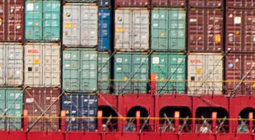How a shipping carbon tax could help Africa build climate resilient trade
Pricing the emissions of the international shipping industry could raise $100 billion/yr.
With Africa disproportionately affected by climate change and its impacts worsening other deficiencies, development is urgent. African countries are well aware of this and are committed to adapting to and mitigating as demonstrated by their Nationally Determined Contributions ().
The difficulty is that implementing these national climate plans costs around between 2020 and 2030 (or about $250 billion a year). African governments can barely cover 10% of this total. At least 77% of the greenhouse gas (GHG) emissions reductions envisaged by African NDCs are conditional on international support.
The result has been huge shortfalls in what is needed. In 2020, for instance, annual climate finance flows in Africa – from domestic and international sources – amounted to just of the sum required.
It is in this context that a proposal to tax GHG emissions from the international shipping industry is advancing at the UN’s International Maritime Organization (). The proposed levy comes as climate countries call for more global action and has been supported by over 100 countries, from the Global South and North.
The main goal of taxing shipping emissions is to decarbonise a sector that accounts for approximately of total global GHG emissions. The idea is that putting a price on use of fossil fuels will raise money that can subsidise the use of green fuels and technologies and help bring them to market. Even a relatively low price per tonne of around $100 could raise as much as a year.
As well as going towards upgrading the shipping industry to become zero-carbon, climate vulnerable countries argue that some revenues should also go towards helping them adapt to climate change. This would be separate and additional to developed countries’ pledge to provide per year in climate finance and to the Loss and Damage Fund that was operationalised at COP28 and has received pledges of to date.
There are concerns that an emissions tax could maritime transport costs in the short- to medium-term. This could particularly affect developing countries. More than of Africa’s imports and exports are carried by sea. Meanwhile, the implementation of the African Continental Free Trade Area () is expected to lead to the need for even maritime transport services.
Fortunately, however, the overall impacts of an emissions tax on trade costs are expected to be . Putting a price on emissions would affect only ship running costs, which is one of the five main determinants of maritime transport fees. The shipping industry itself, represented by the International Chamber of Shipping (), has said that a levy on emissions significantly affect the cost of trade because it will fall well within existing levels of volatility in the price of bunker fuel.
Building climate resilience
If African countries were to receive funds from a maritime emissions tax, they could use them to build and foster a climate-resilient intra- and inter-regional trading system in a variety of ways.
They could improve their maritime transport and address other contributing to higher trade costs and hence trade competitiveness. Upgrading technical capacities for trade facilitation and seaport efficiency, including digitalisation and automation of customs processes, would help maritime transport costs, trade, trade balance, food prices, and economic growth.
In line with Article 10 of the , ship-owning African could reinvest the funds (or seek a technology transfer equivalent to it) in their vessels to improve fuel efficiency and upgrade to low- and fuels. This is important as Africa envisions increasing its share of global ship ownership to at least by 2050 up from its current share of around 1%.
African countries with could channel the funds to enhance the resilience of their port infrastructure to climate-related and other natural . It is also important to enhance the of the continent’s roads and bridges in the face of increasing risks. On average, an African country incurs costs of annually for repairing and maintaining road infrastructure due to increased stressors from climate change.
All in all, the proposed pricing of emissions from global shipping bears ample opportunities to accelerate climate-resilient development in Africa. The funds can be used to make their transport (road and maritime) and trade (intra- and inter-regional) systems more resilient to natural hazards. Such investments will have cross-sectoral and cross-border benefits.
This is particularly important in light of AfCFTA, which is expected to intra-African and maritime freight by 28% and by 62% respectively and requires additional investments in transport to maximize the potential benefits.
African countries should actively engage in the process to push for a maritime climate tax. Their participation and voice are crucial not only because they are among the most vulnerable countries to climate change but also because they represent roughly a quarter of IMO’s 175 states.
The proposed tax is in line with Africa’s own for more global climate actions and provides an opportunity to implement 2050 Africa’s Integrated Maritime Strategy () “to foster increased wealth creation from Africa’s oceans and seas by developing a sustainable thriving blue economy”.
Cover photo: A tax on the international shipping could help decarbonise a sector that is responsible for 3% of greenhouse gas emissions. Credit: Blake Thornberry.




